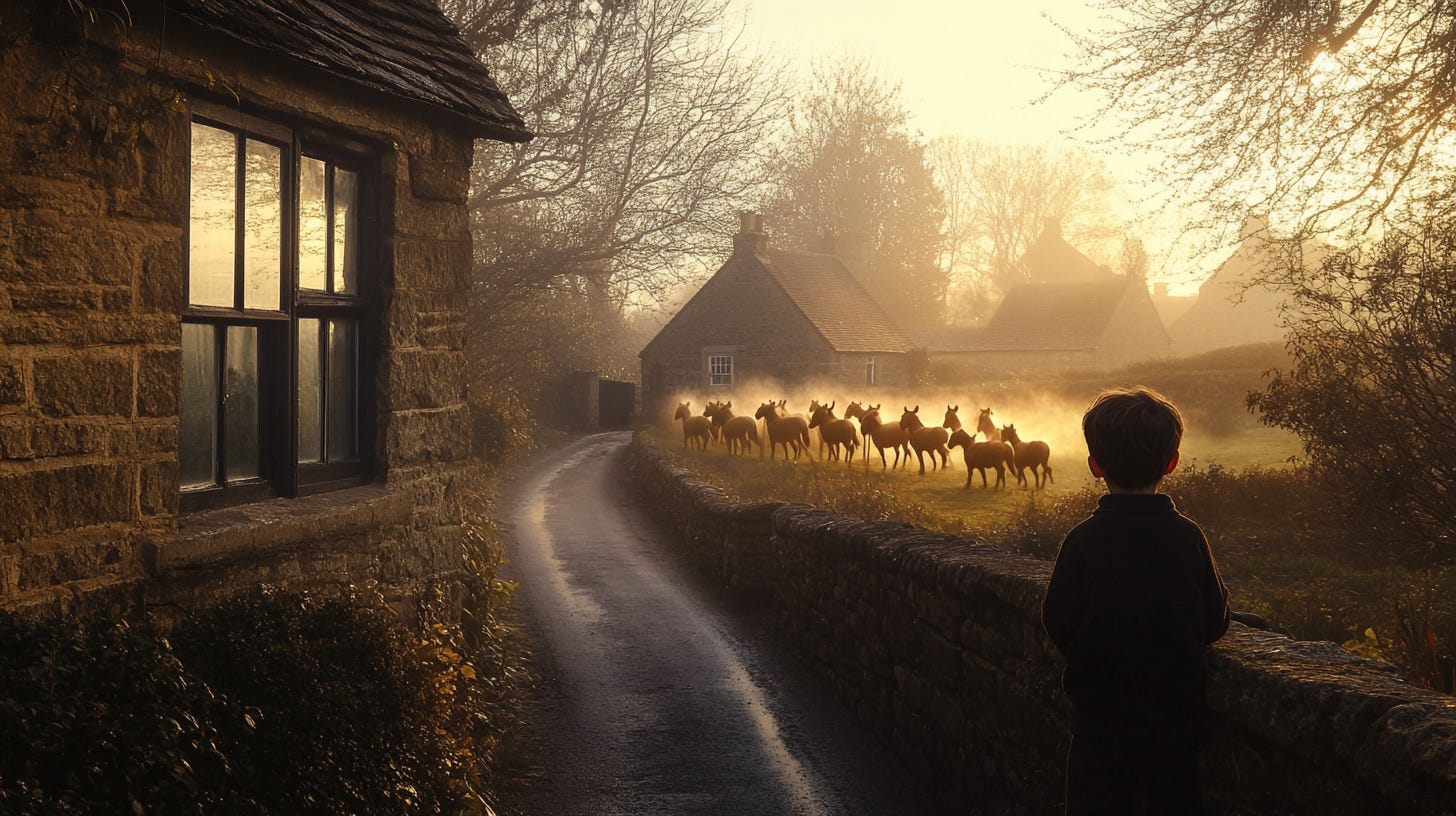There was a time in my life when I truly believed a man at the top of our lane owned a herd of donkeys.
Every week, I missed them by seconds.
Every week, my dad told me what I could’ve seen—if I’d just been a bit quicker.
This is one of my earliest memories—not of donkeys, of course, but of my dad’s particular kind of mischief.
The kind that made you laugh before you realised you’d been had.
The kind that, somehow, meant you were loved.
I carried this story for years before writing it down.
It’s stayed with me. I think you’ll see why.
Some memories don’t just stick—they let you back in.
This one’s a portal. A way of slipping into the soft edges of childhood, where magic and mischief were often the same thing.
It takes me back to our house on Seanor Lane, my dad just out of frame—always waiting with another story.
He was my favorite person in the world.
He still is.
And when I reread this, I can almost hear him.
The pause before the punchline.
The quiet delight in the con.
The way he made the world bend just enough to believe in donkeys.
This one’s for him.
If you’re curious, here’s the original version I wrote 31 years ago—the year after he died—when I was still trying to make sense of the shape and size of the hole he left behind.
Mr. Seward’s Donkeys
It always started the same way.
“Quick! Robert! Come and look! Mr. Seward’s donkeys are going past!”
I’d drop whatever I was doing—toast, Lego, a badly drawn dinosaur—and run to the front window, face pressed against the glass.
Nothing.
“They’ve just gone,” Dad would say, already turning back to his tea. “If you hurry, you might still catch them going up the lane.”
Out the door I’d go. Socks skidding across lino. Hope louder than reason. But there was never anything there—just the empty road and the soft ache of being too late.
He’d tell me what I’d missed. How Mr. Seward had a full caravan of donkeys. How I could’ve ridden one, if I’d been quicker. His face gave nothing away. No wink. No smile. Just the calm delivery of a man who’d seen it all.
And I believed him.
Week after week.
From about the age of four to nine, I went chasing invisible donkeys like it was my job. The story changed enough to keep it alive. One week, they were seaside donkeys on holiday from Skegness. The next, Mr. Seward was launching a donkey ride service from Locko Brook to Pilsley Wood—“scenic route included.”
He had a way of pausing—just long enough before a new detail—to make it sound like he was remembering, not inventing. That’s what made it real. That’s what made me stay in it.
And then one day, I saw Mr. Seward.
He stood at the top of the lane, arms behind his back, watching the world in that quiet way old men do. Ruddy cheeks, big frame, a living Dig for Victory poster. He looked like someone who’d owned donkeys. Or might have. Once.
I decided to make my move.
I walked up slowly, said something about the weather—then, as if offhand, brought up the donkeys.
He didn’t respond.
Didn’t nod. Didn’t blink. Just kept looking out at the road.
After a moment, he shifted his weight slightly, as if I’d stirred something—but whatever it was, it stayed where it was.
I tried again. Said something about them needing to head back to the beach soon.
Still nothing. Like I didn’t exist.
I turned. Walked a few steps. Then ran—arms pumping, lungs tight—until I got back home.
After that, if he was at the top of the lane, I took the long way round. It wasn’t fear, exactly. It was something softer, heavier. The kind of shame you don’t know the name for until years later.
When I heard he’d died, I felt... relieved. Not because I didn’t like him. But because it meant I could walk up the lane again without that sick feeling in my chest.
I thought it was my fault. Like I’d broken something. Looked too closely and made it stop working.
I never told Dad what happened. I wish I had. He’d have come up with another story—something about a donkey embargo or a secret council agreement. He’d have made it make sense again.
But he’s gone now, too.
So this is the version I keep.
No, I never saw Mr. Seward’s donkeys.
But for a while, I believed in them.
And maybe that was the point.



Thank you! 🙏🏼😊
I've been without him now for as long as I had him in my life. I was 32 when he died, and I'm now 64. I think of him so often, and I continue to be amazed at the new insights that unfold: his kindness; his compassion; and all that he overcame. There is often so much more to unlock in our memories when we revisit them from who and where we are today.